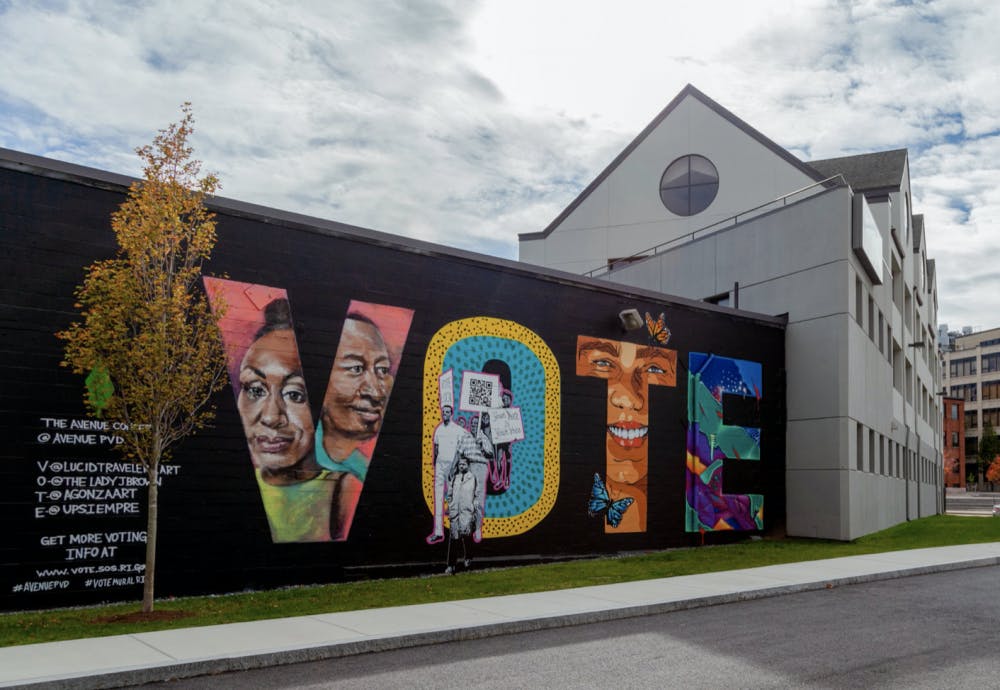In light of the presidential election, the University and student groups have prepared support resources for community members, hoping to address mental health concerns stemming from returning election results.
“We want to emphasize that there are many opportunities for reflection, examination and being in community with one another over the coming days,” wrote President Christina Paxson P’19 and Provost Richard Locke P’18 in a Nov. 4 email to the University community following Election Day.
While the election would undoubtedly present opportunities for reflection, Paxson and Locke wrote, any support for students would need to be different than in years past because of the COVID-19 pandemic.
In-person discussions have shifted online. The evening of Nov. 4, Paxson, Locke and other community leaders — including Reverend Janet Cooper Nelson, chaplain for the University, and Stephen Bozier ’17, president of the Student National Medical Association for Alpert Medical School — spoke during a “webinar of reflection.” In their email, Paxson and Locke also advertised virtual debriefs hosted by the Watson Institute and the Swearer Center for Public Service on Nov. 5, among other events.
In 2016, students distressed by President Donald Trump’s victory gathered in droves around campus, many crying, The Herald previously reported. This year, such gatherings and protests are strongly discouraged by the University because of the pandemic.
In an Oct. 27 Today@Brown announcement, Executive Vice President for Planning and Policy Russell Carey and Vice President for Campus Life Eric Estes discouraged members of the community from participating in “rallies and demonstrations” following the release of election results. Carey and Estes noted that COVID-19 safety protocols prohibit large gatherings.
As the University advertised webinars for anxious students, Brown Votes, a Swearer Center student group that advocates for voter registration and civic engagement, prepared its own collection of resources for the community.
The list on the Brown Votes’ website contains a wide assortment of events and resources for students, ranging from University-hosted events to virtual discussions among groups for students from marginalized communities.
Kimberly Collins ’22, co-founder of Brown Votes, said she hopes that students can find resources that best suit their needs during the stressful post-election period. Collins, along with her colleagues at Brown Votes and representatives from cultural groups on campus, chose to present resources that focus on students’ diverse backgrounds.
“The reality of the situation is that these elections are consequential for marginalized communities,” Collins said. “There’s a lot on the line here.”
The fact that there is still no projected winner in the presidential race compounds people’s stress, Collins said. Rhetoric that casts doubt on the validity of votes yet to be counted — largely perpetuated by Trump — can also increase students’ anxiety, she said.
The Brown Votes list includes Counseling and Psychological Services as a resource for students. According to Lisa Frappier, a psychiatrist with CAPS, the service has increased availability for next-day appointments with students.
We “are prepared to support all students through their experiences” after the election, Frappier wrote in an email to The Herald. “Having a safe place to process these types of feelings and find healthy ways to persist so they can succeed at Brown and beyond is part of our mission.”
Several identity groups also offered support to those anxious about the election. Disability Justice at Brown hosted an online breathing room on the night of the election from 7 to 11 p.m.
“It’s just a space where people can discuss, process and reflect everything that’s going on,” said Sumera Subzwari ’21, lead coordinator of DJAB. “Many people are in uncertain, unstable situations right now. Especially in this election, we need to emphasize community support and self-care."
The LGBTQ Center designed a post-election space for graduate and medical students to discuss how the election will affect the LGBTQ+ community. “We wanted to create a space where students have a voice and can connect with others in a meaningful way, something that's been really difficult given the pandemic and the need to keep our meetings and programs virtual,” wrote Director of the LGBTQ Center Kelly Garrett in an email to The Herald.
She added that LGBTQ+ graduate and medical students especially “may feel a bit isolated in their academic programs and departments,” so the center’s programming was all the more important to building bridges between individuals.
The Brown Center for Students of Color is participating in a series of post-election community open hours where students can “take their mind off of events on a national scale,” according to Assistant Vice President for Campus Life Engagement Loc Truong, who is also interim director of the BCSC.
“Our students face adversity from oppressive systems day-to-day, and the US Election brings this experience painfully to the forefront,” Truong wrote in an email to The Herald. “It is critical that we at the BCSC and other centers are present and supportive to students as they navigate through a fraught election cycle.”
The Sheridan Center for Teaching and Learning also provided resources to faculty to help guide their teaching during the election. Executive Director of the Sheridan Center Mary Wright said that the center shared its guidance in a newsletter prior to the election “so that people could think intentionally about what their course plans might be.”
“I think there’s a common impression that one should steer away from discussing the election in the classroom, and I think it’s a misguided direction,” Wright added. “It’s important to acknowledge this event in the classroom and treat students holistically.”

Ben Glickman was the 132nd editor-in-chief and president of The Brown Daily Herald. He previously served as a metro editor and oversaw the College Hill and Fox Point beat, in addition to writing and editing about city politics, COVID-19 and the 2020 election. He is the co-creator of the Bruno Brief, The Herald's first news podcast. In his free time, he is passionate about birds (also tweeting) and eating way too spicy food.





